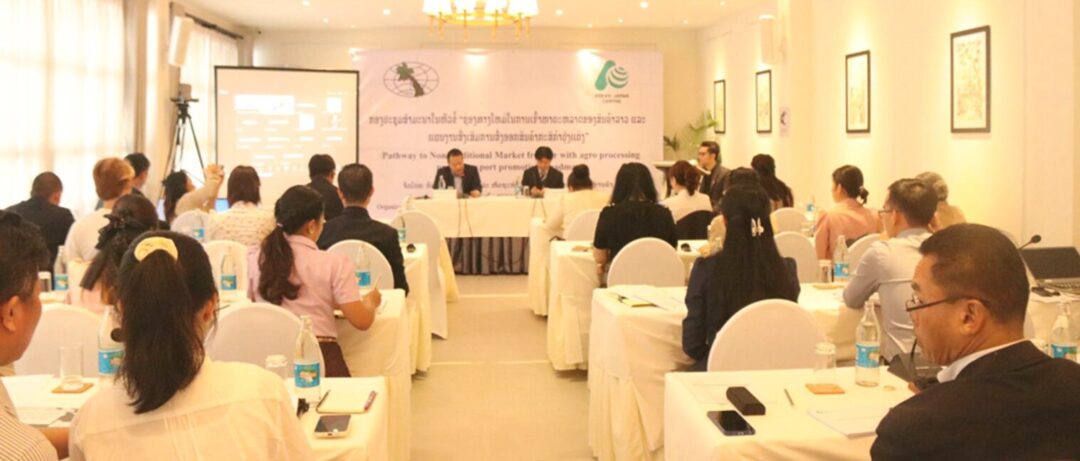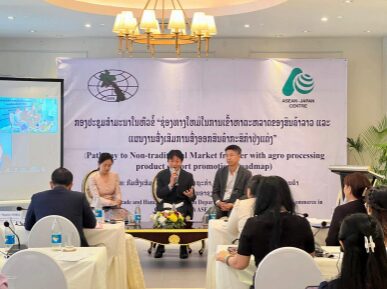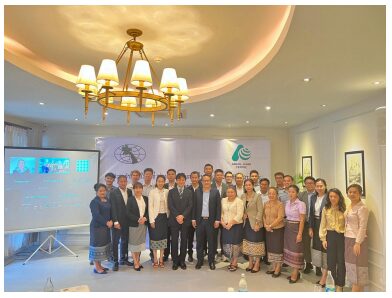Photo: Courtesy of Trade and Handicraft Promotion Department, Ministry of Industry and Commerce, Lao PDR
Executive Summary
On 30 August 2024, the ASEAN-Japan Centre, in partnership with the Trade and Handicraft Promotion Department (DTPH) of Lao PDR’s Ministry of Industry and Commerce, hosted the “Lao PDR Post-2026: Pathways to Non-traditional Market Frontiers with Agro-processing Product Export Promotion Roadmap” a hybrid workshop in Vientiane, Lao PDR. The event brought together around 70 participants from various sectors, both in-person and online.
As Lao PDR prepares for its graduation from Least Developed Country (LDC) status in 2026, local enterprises are tasked with adjusting to a new global trade landscape that may limit preferential treatment. The workshop placed particular emphasis on diversifying into non-traditional markets—specifically through agro-processing—and capitalizing on Free Trade Agreements (FTAs) to secure access to strategic markets, notably Japan and ASEAN. The DTPH reiterated its commitment to incorporating Lao MSMEs’ perspectives in shaping the Agro-processing Export Roadmap, ensuring their competitiveness in the global economy post-LDC graduation. Mr. Dala Indavong, Deputy Director General, Department of Trade and Handicraft Promotion, Ministry of Industry and Commerce, Lao PDR and Dr. Kunihiko Hirabayashi Secretary General, ASEAN-Japan Centre opened the workshop by emphasizing the importance of equipping Lao MSMEs to thrive in the changing trade and investment environment.

(Photo: Courtesy of Trade and Handicraft Promotion Department, Ministry of Industry and Commerce, Lao PDR)
The list of topics and speakers are as follows:
- Recent Trends and Activities Related to RCEP
Mr. OKAMOTO Yusuke, Director for FTA/EPA Negotiations, Trade Policy Bureau, Ministry of Economy, Trade and Industry (METI), JAPAN - Export and Investment Promotion in Vietnam: Connect Resources and Promote Exports
Mr. Nguyen BA HAI, Deputy Director, Investment Promotion Center for Industry and Trade, Vietnam Trade Promotion Agency - Ministry of Industry and Trade of Vietnam, VIETNAM - Initiating Efforts to Provide Assistance for Entering Global Markets: Experience from Thailand
Ms. Saibhorn SHANTAVASINKUL, Department of International Promotion (DITP), Ministry of Commerce, THAILAND - International Trends, Standards, and Market Exploration Approaches including Japan market: Recommendation for Lao PDR
Mr. Yasushi ISHIDA, Assistant Director, Research and Policy Advocacy, ASEAN-Japan Centre - Briefing on Lao Agro-processing Product Export Promotion Roadmap
Dr. Piya WONGPIT, Associate Professor, Head of Finance and Banking Department, Faculty of Economic and Business Management, National University of Laos
The presentations can be accessed here: [PRESENTATIONS] Lao PDR Post-2026-Pathways to Non-traditional Market Frontiers with Agro-processing Product Export Promotion Roadmap
- Panel Discussion Participants:
Moderator: Ms. Phommaly Saynorlath, Technical Official, Trade and Handicraft Promotion Department, Ministry of Industry and Commerce
Panelists:
- Dr. Piya WONGPIT, Associate Professor, Head of Finance and Banking Department, Faculty of Economic and Business Management, National University of Laos
- Mr. Pongchai CHIRDMANUSATHIAN , General Manager, Siam Quality Grain Co., Ltd.,
- Mr. BUI The Anh, Strategy Director, Ernst & Young-Parthenon, Viet Nam
- Mr. Yasushi ISHIDA, Assistant Director, Research and Policy Advocacy, ASEAN-Japan Centre
Key Takeaways
- Alignment with Japan’s Trade Standards: Lao PDR MSMEs are well-positioned to engage with Japan, thanks to a shared focus on high-quality, environmentally-friendly, and ethically-produced products. However, significant gaps remain in market intelligence and trade facilitation.
- Challenges Ahead–Strategic FTA Utilization: MSMEs can greatly benefit from FTAs, but they require further capacity development to fully leverage these agreements for market access.
- Roadmap to Success: The Agro-processing Export Roadmap developed with MSME input emphasizes inclusivity, ensuring that the strategies align with both local needs and international market demands.
Japan: A Strategic Trade Partner for Lao PDR MSMEs
Lao MSMEs are increasingly recognizing Japan as a strategic export market, given Japan’s strong emphasis on high-quality, ethically sourced products. According to Ms. Dalayphone Sayasithsena of Saya Brand, Lao MSMEs prioritize producing goods that meet rigorous quality standards while maintaining meaningful relationships with the communities involved in their supply chains. This alignment in values positions Japan as a particularly favorable market. However, MSMEs expressed concerns about the lack of easily accessible market intelligence for Japan, highlighting the need for structured guidance on navigating this critical trade relationship.
Creating Trade Networks through FTAs & Collaboration with Neighbouring Countries
A key outcome of the event was the collaboration between Japan, Thailand, and Vietnam, focused on ensuring Lao PDR’s continued economic growth post-LDC graduation. Representatives shared their experiences, challenges, and strategies to help MSMEs become export-ready, improve market access, and leverage Free Trade Agreements (FTAs).
The Panel Discussion featuring private sector leaders Mr. Bui The Anh (EY Parthenon Vietnam) and Mr. Pongchai Chirdmanusathian drew active participation. Mr. Bui offered valuable tips for Lao MSMEs, emphasizing the importance of:
- Understanding target markets by studying consumer behaviour, regulations, and cultural nuances.
- Leveraging FTAs to reduce tariffs, gain competitive pricing, and ease market entry.
- Investing in product quality improvement and meeting international standards for credibility.
- Building strong relationships with local partners and distributors.
- Starting small, focusing on key products, and scaling up strategically.
This session provided Lao MSMEs with practical insights into export processes, documentation, and market access, while also clarifying the complexities of FTA utilization.
To conclude, Mr. Yasushi Ishida (ASEAN-Japan Centre) highlighted that while Lao PDR will lose certain international support mechanisms after LDC graduation, the transition offers a chance to build new trade networks through FTAs. He stressed that the next two to three years are crucial for the government, private sector, and trade promotion agencies to collaborate and prepare Lao MSMEs for the post-LDC environment.
Co-Creating the Agro-Processing Export Roadmap with MSMEs
Dr. Piya Wongpit, Head of the Finance and Banking, Department at the National University of Laos, presented a comprehensive framework for the Agro-processing Export Roadmap. He highlighted the importance of market research, quality certification, and an understanding of consumer preferences as key drivers for successful market entry. The inclusive development process ensures that the roadmap is not only aligned with global market demands but also responsive to the specific needs of Lao MSMEs, facilitating their growth and integration into the international trading system.

(Photo: Courtesy of Trade and Handicraft Promotion Department, Ministry of Industry and Commerce, Lao PDR)
Key Strategies for Preparing Lao MSMEs for International Markets
The workshop outlined four key strategies to support Lao MSMEs for sustainable growth and competitiveness in global markets:
- Product Quality Development
To meet the high standards of export markets such as Japan, 30% of surveyed participating MSMEs pinpointed their need for support in enhancing production methods, incorporating advanced technologies, and obtaining internationally recognized certifications. These steps are essential to overcoming one of the most significant barriers to market entry: product quality compliance. - Maximizing Free Trade Agreement (FTA) Benefits
The workshop underscored the importance of leveraging FTAs—especially the Regional Comprehensive Economic Partnership (RCEP) as explained by Mr. Okamoto of the METI, Japan—to mitigate tariff burdens and gain market entry advantages. However, there remains a critical need for targeted capacity-building programs to help MSMEs fully understand and capitalize on these agreements. - Fostering Business-to-Business (B2B) Linkages
Establishing robust business networks through business matching and strategic partnerships was a recurring theme. Linking Lao MSMEs with potential partners in ASEAN and Japan is vital for ensuring supply chain stability and fostering long-term export relationships. - Facilitating Market Research and Export Readiness
Participants identified the need for enhanced support in conducting market research, particularly in understanding the specific demands and dynamics of the Japanese market. The ASEAN-Japan Centre was recognized as a key partner in facilitating this data collection and providing the necessary market insights to better position MSMEs for export readiness.
Looking Ahead
As Lao PDR transitions from LDC status in 2026, the key to ensuring the competitiveness of Lao MSMEs lies in the continued collaboration between government bodies, international trade organizations, and local enterprises. Future initiatives will focus on deepening capacity-building programs, fostering stronger business linkages, and expanding market intelligence efforts to support MSMEs in tapping into non-traditional markets like Japan. The next phase will prioritize targeted business matching opportunities and advanced training in FTA utilization, with Japan serving as a cornerstone of Lao PDR’s future trade strategy.


